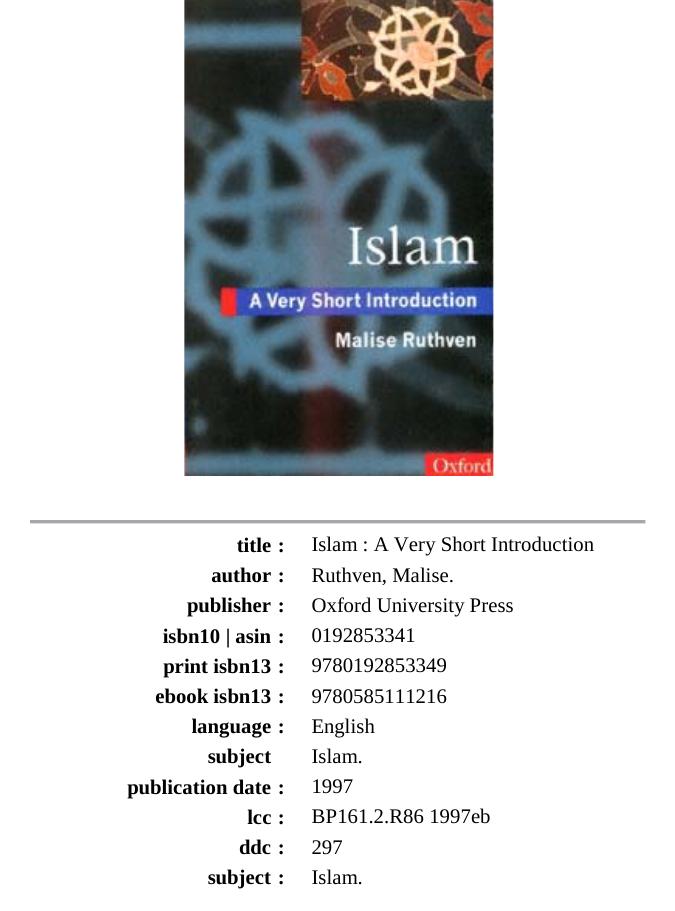Islam: A Very Short Introduction by Malise Ruthven

Author:Malise Ruthven
Language: eng
Format: epub, pdf
Publisher: OUP Oxford
Published: 2012-05-05T04:00:00+00:00
The roots of Islamic law
1. Quran
As the direct and unmediated Word of God, the Quran is the primary source of law in Islam. In the broadest sense, the whole of the Quran is law for Muslims. God proclaims himself in a Book, every single verse of which can be perceived as a divine command. Only a small proportion, however – about 10% of the Quran’s 6,000 verses – contains injunctions that can be converted into positive religious or legal requirements. Most of these occur in passages dating from the Madinese period when the Prophet was actively engaged in lawmaking. There are prohibitions on certain foods (pork, carrion, wine, animals slaughtered in pagan ceremonies), a number of legal rules concerning family law (marriage, divorce, and inheritance), criminal law (the hudud crimes, including penalties of highway robbery, illicit sexual activity, slander, and wine drinking), rules about witnesses, and commercial regulations including the ban on riba (usury) and forms of contracts. None of these rules is wholly free from ambiguities, and lawyers who relied exclusively on the Quran for legislative material would soon find themselves engaged in ‘endless debate about whether some verses have been abrogated by others, as most Muslims believe; and if so, which verses were abrogated by which’.
A moral universe
‘The Quran is an unparalleled window into the moral universe. It is a source of knowledge in the way that the entire corpus of legal precedent is for the common law tradition: not so much as an index of possible rulings as a quarry in which the astute inquirer can hope to find the building blocks for a morally valid, and therefore, true system of ethics … The hadith-reports, considered as a whole, contain the sunna of the Prophet, which is not simply a record of the Prophetic doings but of the Prophet’s significant, exemplary acts, non-acts, and sayings. The Quran’s integrity was guaranteed by its miraculous inimitability and plural transmission; the prophetic sunna was vouched for by the immaculate protection (isma) of the Prophet, Quranic attestation, and plural transmission. What is noteworthy is that, except in broad outline, the sunna was not a mere catalog of model behaviour to be emulated, but rather a collection of data which required assessment and application in an appropriate context. A life lived totally in accord with the Moral becomes a window into moral knowledge. The Prophet is thus, for the practitioner of fiqh, not really a model but a normative case, not so much a person as a principle.’
Kevin Reinhart, ‘Islamic Law as Islamic Ethics’, Journal of Religious Ethics, 11/2 (Fall 1983), 189, 190
Download
Islam: A Very Short Introduction by Malise Ruthven.pdf
This site does not store any files on its server. We only index and link to content provided by other sites. Please contact the content providers to delete copyright contents if any and email us, we'll remove relevant links or contents immediately.
The History of Jihad: From Muhammad to ISIS by Spencer Robert(2629)
Nine Parts of Desire by Geraldine Brooks(2369)
The Turkish Psychedelic Explosion by Daniel Spicer(2358)
The First Muslim The Story of Muhammad by Lesley Hazleton(2273)
The Essential Rumi by Coleman Barks(2048)
1453 by Roger Crowley(2031)
The Last Mughal by William Dalrymple(1858)
Trickster Travels: A Sixteenth-Century Muslim Between Worlds by Davis Natalie Zemon(1848)
Muhammad: His Life Based on the Earliest Sources by Martin Lings(1648)
God by Aslan Reza(1644)
by Christianity & Islam(1636)
A Concise History of Sunnis and Shi'is by John McHugo(1568)
No God But God by Reza Aslan(1545)
Magic and Divination in Early Islam by Emilie Savage-Smith;(1534)
The Flight of the Intellectuals by Berman Paul(1503)
Nothing to Envy by Barbara Demick(1450)
Art of Betrayal by Gordon Corera(1431)
What the Qur'an Meant by Garry Wills(1395)
Getting Jesus Right: How Muslims Get Jesus and Islam Wrong by James A Beverley & Craig A Evans(1342)
